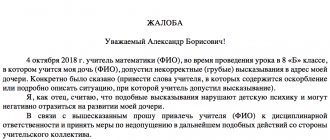The law states: a child has the right to live and be raised in a family, to receive care from his parents and to live with them.
The dissolution of a marriage between spouses not only terminates the regime of joint property, but also deprives the child of the right to grow up in a full-fledged family. Statistics show that in Russia almost every third family consists of a child and a mother.
In such a situation, when parents divorce, it is necessary to preserve the psychological state of the child and maintain his financial condition until he reaches the age of majority.
Read the article about how to dissolve a marriage if you have minor children without violating their rights.
General procedure for divorce in the presence of common minor children
The presence of minor children complicates the divorce process. As a general rule, minors are children under 18 years of age; parents are considered to be their natural or adoptive mother and father.
Divorce in the presence of minor children occurs in the registry office (exceptional cases) or in court.
You can apply for divorce to the registry office only in the absence of minor children, a property dispute and with the consent of both spouses.
Exception : it is possible to dissolve a marriage in the registry office if there is a child in the family when the second spouse is recognized by the court as incompetent, missing, deceased, or is serving a sentence of actual imprisonment for a term of over 3 years. In such a situation, it is necessary to submit to the registry office an application for divorce, a marriage certificate, a judicial act that has entered into legal force, as confirming the basis for divorce (a court decision recognizing the spouse as missing, deceased, incompetent, or a sentence passed against the spouse) , a receipt for payment of the state fee in the amount of 350 rubles (in accordance with Article 333.26 of the Tax Code of the Russian Federation).
It is important to know : in a situation where one of the spouses has children, but the second spouse is not their father, a divorce can be carried out in the registry office.
In addition to the above cases, divorce of spouses in the presence of common minor children can only be carried out in court. The statement of claim by the spouse personally or through his representative is submitted to the magistrate or district court.
The Magistrate's Court considers cases of divorce in the presence of a child in the family in the following circumstances:
- the amount of joint property of the spouses subject to division is no more than 50,000 rubles;
- there is no dispute between the spouses regarding the further residence of the children;
- the existence of an alimony agreement or other agreement on the procedure for paying alimony for minor children.
If disputes arise about the division of property, as well as if one of the spouses does not want to get a divorce, divorce in the presence of children occurs in the district court.
As a general rule, a claim for divorce is filed in the district court at the defendant’s place of residence. However, if there is a minor child or a serious illness, the application may be submitted to the court at the place of residence of the plaintiff.
In the absence of the ability or desire of one of the spouses to participate in court hearings, the law gives him the right to use the assistance of a representative by proxy.
The statement of claim must contain the following information:
- details of the judicial authority to which the claim is sent;
- information about the plaintiff and defendant;
- the circumstances of the case and the reason for the divorce;
- information about the presence of minor children, jointly acquired property, a marriage contract, an agreement on the division of property;
- reasons for leaving the children with the plaintiff;
- the plaintiff's demands (divorce, payment of alimony, division of property, determination of the place of residence of children).
In addition to the statement of claim, you must provide the following package of documents to the court:
- receipt of payment of state duty in the amount of 650 rubles;
- marriage certificate;
- children's birth certificate;
- alimony agreement (if available);
- marriage contract (if available);
- power of attorney if a representative of the spouse goes to court.
Before starting the consideration of a divorce case in the presence of minor children, the court gives the spouses the opportunity to reconcile and provides a period of three months for this. If there is no progress in the relationship between the spouses, the court begins to consider the case.
If all the necessary documents are provided to the court and the parties appear at the court hearing, then the consideration of the divorce case may be limited to one trial.
At any time during the court hearing, parents have the right to agree on who the child will stay with, what will be the procedure for the interaction of the second parent with him, and what amount of child support payments he will pay.
At the end of the hearing, the court makes a decision, each spouse receives a copy of the decision and is sent to the registry office to receive a certificate of divorce.
Please note : a court decision on divorce with minor children is a confirmatory fact of divorce. But if one of the spouses expresses a desire to remarry, then he will need to obtain a certificate of divorce from the previous marriage.
If one of the spouses fails to appear at the court hearing, the court postpones the consideration of the case and re-notifies the spouse of the need to appear in the courtroom. If the spouse repeatedly fails to appear, the court considers the case in his absence and makes a decision in absentia on divorce. The absent spouse has the right to appeal such a decision within 7 days.
It is important to know : the court makes a decision on divorce in the presence of children only if it is convinced that all the rights and interests of the minor child are respected. That is, during the court hearing, the court must establish that the child will live and grow up in a favorable environment, is financially secure, the divorce of his parents will not affect his psychological and physical health, and living with one of the parents will not deprive him of the right to communicate and meet with second parent.
2.3. THE PRESENCE OF CHILDREN MAY AFFECT THE SIZE OF THE SHARE
As a general rule, jointly acquired property is divided in half between spouses. But the court has the right to deviate from this rule if it is necessary to protect the interests of the spouses’ common children. Courts may increase the share of the parent remaining with the child in the apartment or house where the child lives (or award this entire property); the share of such parent in the total debt obligations of the spouses may also be reduced.
But in exceptional cases (unscrupulous behavior of the second spouse or serious illness of the child), the court may award a larger share of the entire property to the one who remains to live with the child.
Paragraph 2 of Article 39 of the RF IC allows the court to deviate from the principle of equality when dividing property and allocate a larger share to one of the parents in the interests of the children. However, their mere presence as a dependent does not affect the size of the former spouse’s share. This is a right, not an obligation of the court. There is no uniform judicial practice on this issue, however, having studied court decisions, one can find a number of reasons why judges often deviate from equality of shares.
Let's consider the main ones:
Agreement on children upon divorce
Issues related to the residence, upbringing, and financial support of a child after the parents’ divorce are determined by agreement of the spouses or in court.
Parents can independently resolve the above issues by drawing up a children's agreement in simple written form. At the request of the parents, such an agreement can be notarized.
If at the time of drawing up the agreement the children are 10 years old, parents must take into account their opinion and desire.
The content and form of the agreement regarding children is not established by law. It is important that the clauses of such an agreement do not violate the rights and interests of minor children.
A children's agreement may include the following provisions:
- with whom the children will remain after the divorce;
- further place of residence of children;
- frequency and amount of payments for children;
- the procedure for the interaction of children with a parent who will live separately;
- other provisions.
It is important to know : if this agreement on children contains clauses on the procedure for paying alimony, then it must be certified by a notary.
The agreement on children is drawn up in 3 copies, one is submitted to the court, the rest remain with each of the spouses.
Parents have the right to submit an agreement regarding children to the court in the following ways:
- in writing along with the statement of claim;
- by filing an oral petition at the court hearing to attach such a document to the case.
In the absence of such an agreement, the court, during the consideration of the case of divorce with children, independently resolves all issues related to the further residence and upbringing of minors.
If an agreement about the children has not been drawn up, but the parent wants the court to side with him when deciding the issue of the children’s further residence, then he has the right to send to the court, along with the statement of claim, documents containing the following information:
- conditions of residence of the children and each parent;
- financial support for children, their pastime.
Prohibition on divorce if there are minor children
The law prohibits divorce at the request of the husband during the wife's pregnancy or within one year after the birth of the child. This was done in order to protect the financial situation of a non-working wife and young child.
Please note : the prohibition on divorce in the above case also remains in a situation where the child was stillborn or died in the first year of life. In addition, the law does not allow a husband to divorce in a situation where he is not the father of the child or if the wife becomes pregnant during the divorce proceedings.
To confirm her position, the wife must submit to the court a certificate from a medical institution or other documents confirming the fact of pregnancy.
Divorce during the wife's pregnancy is possible only in two cases:
- mutual consent of the spouses to divorce. In this option, the spouses can file for divorce at the registry office (in the absence of minor children) or write a statement of claim to the court and dissolve the marriage in court;
- pregnant wife wants to divorce. If the spouse does not agree to divorce, then the divorce process will take place in court.
After the divorce, the husband’s obligation to help his former pregnant wife financially does not stop. For three years after divorce, a man must support his ex-pregnant wife or one who gave birth less than a year ago, and also pay child support. If the child’s parents were not married, the ex-spouse will only pay alimony.
The procedure and amount of payments are established by agreement between the spouses. If there is no such agreement, the amount of alimony collected from the ex-wife is determined by the court. When setting the amount of payment, the court takes into account the financial condition of the former spouses, their state of health, place of residence and other conditions.
At the court hearing, at the request of the former spouse, the issue of reducing alimony payments may be considered. For such a reduction, the ex-husband must provide the necessary evidence: loss of work, presence of minor children, serious illness.
Please note : if a child was born to a woman and a man who were not registered in marriage, then the law does not provide for a mandatory mark in the documents that the child was born from this particular man.
Determining the place of residence of a minor child after the parents’ divorce
The well-being of children upon the dissolution of their parents’ marriage is the main task when deciding on their future place of residence.
In this case, the place of residence of children after divorce is established by agreement of his parents. If no agreement has been concluded, then such a place is appointed by the court based on the interests of the child and taking into account his wishes.
According to the law, none of the parents has a priority right to have their children live with them after a divorce.
The court determines this based on the specific situation and individual living conditions of each parent.
When assigning a place of residence, the court takes into account the following. The child’s attachment to each of the parents, as well as to close relatives on the part of each parent. Children over 10 years old are asked for their opinion on who they would like to stay with after their parents’ divorce.
Parents' opinion . In other situations, the court may find that one of the parents does not want to permanently live with the children and raise them. Therefore, when resolving this issue, he gives preference to the other parent.
Place of residence of each parent . If the mother lives in the area where the child grows up, goes to school and to sections, then the court will most likely determine the child’s place of residence also in this area.
Child's age . Children under 10 years of age are more often left with their mother.
Parents' living conditions. The court pays attention to the conditions in which each of the parents lives: the size of the home, the presence of a separate room for children, individual work and sleeping space, amenities in the house.
Place of work of parents, state of health, level of income and presence of bad habits. All these factors significantly influence the court’s opinion when deciding on the future place of residence of minor children.
If there are several children in a family, the court usually does not separate brothers and sisters into different families, but leaves them to live with one of the parents. In some cases, the child himself has the right to express a desire to live with the second parent and separately from other children.
In addition, the court evaluates with which of the child’s parents a more worthy future awaits and what opportunities each of them can realize for this.
If one of the parents wants the children to live with him, he has the right to send the following documents to the court:
- conclusion of the guardianship and trusteeship authorities that the living conditions of the parent are suitable for children.
- certificates from the place of work confirming income capable of providing children with a decent life.
- positive reference from the place of work.
Please note : the court may order a forensic psychiatric examination, which will reveal the influence of the parents on the child, and also establish a system of interaction with each of them.
2.2. THE COURT WILL TAKE CONSIDERATION OF THE PRESENCE OF CHILDREN WHEN DECIDING THE ISSUE OF AWARDING PROPERTY IN KIND
“In kind” in legal translation means that one of the spouses will become the sole owner of any property, and the second will only have the right to demand monetary compensation.
Courts take into account the interests of children when determining what property the parent living with the child receives. For example, if a family has several residential apartments or houses, the parent remaining with the child will have priority in obtaining housing located closest to the school.
Children's rights after parents' divorce
Divorce of parents' marriage in the presence of a minor child should not violate his property and other rights.
The child's right to communicate with relatives . Despite living with one of the parents, the child has the right to communicate with all relatives.
Property rights of children . Each child, after the divorce of his parents, has the right to receive income from his father and mother, as well as to receive child support payments that the parent with whom he now lives receives for him.
It is important to know : when dividing jointly acquired property, the court may determine that the spouse with whom the children remain will receive a larger share in the property.
The right to live with parents. A child has the right to own, use and live in residential premises with his parents.
1.What is shared between spouses?
The Family Code establishes a list of property that is jointly acquired and subject to division. So, in accordance with Art. 34 of the Family Code of the Russian Federation, it includes the income of spouses, except for those that have a designated purpose. For example, the amounts of financial assistance are not divided. In addition to the income itself, real estate purchased with it, cars, various securities, bank deposits and any other property, except personal belongings, are also subject to division. The main thing is that the property must be acquired using general income.
Important! Even personal property can be recognized as joint property if it is proven in court that during the marriage significant funds from the common property of the spouses were invested in it. Labor, monetary and property investments are taken into account. For example, if major repairs were made in the husband’s apartment, which he received by inheritance, at the expense of common funds, the court recognizes this apartment as common property.
Let's look at the situation: Andrey opened a bank account, and a year later he got married. During the marriage, due to the common funds of the spouses, the amount on it increased several times. In such a situation, the contribution will remain with Andrey, but he will have to reimburse his ex-wife half of the funds invested during the marriage.
As a general rule, all property belonging to the spouses remains with them; children have nothing to do with it. But there is an exception provided for in paragraph 5 of Art. 38 RF IC. Thus, items purchased exclusively for the child are not divided and are transferred to the spouse with whom the child remains. Such things include, for example, stationery for school, children's clothing, musical instruments, toys, laptop, etc. However, compensation in this case is not paid.
Important! A deposit opened in the name of a child, to which funds were deposited from the joint income of the spouses, is not divided after a divorce. He stays with the child. The child's property is excluded from the division. This also applies to real estate that was initially acquired into his ownership or was transferred during marriage.
Child's last name after divorce
After a divorce, children retain the last name that was written on the birth certificate.
If one of the parents wants to change the child’s surname before he reaches the age of 14, then this cannot be done without the consent of the other parent.
Moreover, if the child is already 10 years old, the surname cannot be changed without his consent.
Exception : changing a surname in the absence of the consent of one of the parents is possible in the case when:
- the parent’s place of residence is unknown;
- the parent is declared incompetent by the court or deprived of parental rights;
- the parent does not fulfill the obligation to pay child support.
Upon reaching the age of 14, a minor child has the right to independently change his last name without the permission of his parents or guardianship authorities.
Alimony for minor children
One of the basic rights of a child that must be respected after a divorce is financial support from a parent who does not live with him permanently. Therefore, such a parent is obliged to pay child support until the child reaches the age of 18.
Family law establishes that the procedure, form and amount of alimony payments to children are determined by the parents by drawing up an alimony agreement. At the same time, the parents themselves determine the moment when the collection of alimony for the maintenance of the child begins.
A child support agreement is equivalent to a document of execution; if one of the parents does not fulfill the obligations under the agreement, then the second parent has the right to apply to the judicial authorities for enforcement.
When concluding an alimony agreement, there is a payer (the parent who pays alimony) and a recipient (the parent who receives payments for the child) of alimony, as well as a child, if he is 14 years old at the time of divorce.
The law does not provide for a specific form of alimony agreement. It is necessary that the provisions of the agreement do not contradict the laws and do not violate the rights of the child.
The agreement should include the following:
- information about the payer, recipient of alimony and their minor children;
- the method, procedure and amount of money to be paid;
- term and frequency of payments;
- the amount of penalties in case of late payments;
- other conditions that are introduced by mutual agreement of the parties to the agreement.
The amount of alimony is not strictly limited for the entire period of payment. If circumstances arise that affect the financial situation of the payer, the amount may be reduced or increased.
In the absence of a child support agreement, the court independently determines the amount of payments for child support.
The size of the payment depends on the number of children for whose maintenance alimony is required.
The amount of alimony in accordance with the law is:
- 1/4 of all types of parent’s earnings, if there is one child;
- 1/3 of all types of parents’ earnings, if there are two children;
- 1/2 part of all types of parents’ earnings, if there are three or more children.
The alimony payer may petition the court to reduce the amount of alimony due to financial difficulties due to loss of work or for other valid reasons.
Everything about criminal cases
— in short: official registration of marriage with a detainee is not required (there will be visits and mitigating circumstances without it), but it will significantly simplify both obtaining visits and possible participation in the trial.
— Is it possible to do without registration? Yes, you can.
- common-law spouse has the status of a close person
, while “the impact of the punishment on the living conditions of the convicted person’s family” can be taken into account as a mitigating circumstance.
At the same time, actual family relationships are also recognized ( clause 27
of Plenum No. 58).
I). Marriage registration for participation in protection
- if you need it, in accordance with Part 2 49 of the Code of Criminal Procedure
a spouse can receive the status of a defender (for more details, see here -
A relative
without legal education and experience - as a defender).
- it’s not a fact that you need this - this is for the case if you want to play an active role in the defense: write complaints yourself, participate in debates
).
- the official spouse can obtain this status more easily, and there is less chance of the court refusing admission to participate in the case.
II). Having a family as a mitigating circumstance
- official marriage can be recognized as a mitigating circumstance that the court can take into account ( Part 3 60 of the Criminal Code
).
— more precisely, this norm does not talk about the fact of marriage itself, but about “the influence of punishment on the living conditions of the convicted person’s family.” That is, it is necessary to prove that a heavy punishment will worsen the living conditions of his family.
- but the same applies to civil marriage, in paragraph 27
Plenum No. 58 states that actual family relationships are also recognized.
Children
- You also have the opportunity to use such a mitigating circumstance as the presence of children.
- it’s better if these are young children
(up to 14 years of age), in this case it is a mandatory mitigation (
clause “d” part 1 61 of the Criminal Code
).
- but minor children
(from 14 to 18 years old).
- children do not have to be relatives, but it is required to prove that the defendant takes part in their upbringing ( clause 28
Plenum No. 58).
III). Marriage registration for dates
— official registration of marriage will give you the status of a close relative
, this will make it easier to get dates.
A)
meeting after the verdict (
395 Code of Criminal Procedure
).
b)
meeting after the appeal (
Part 1 75 of the Criminal Code
).
V)
visits in a correctional institution, while only the official spouse has the opportunity for
a long visit
; other persons need special permission from the head of the institution (
Part 2 89 of the Penal Code
).
- the types of visits listed above are also available for a common-law spouse (but there may be difficulties for her, for example, a certificate of cohabitation may be required for a date).
Marriage registration procedure
- if a person is in custody, then you can marry him, but this procedure will require effort and money (for a notary).
- start with a visit to the registry office, they will explain this complex algorithm.









